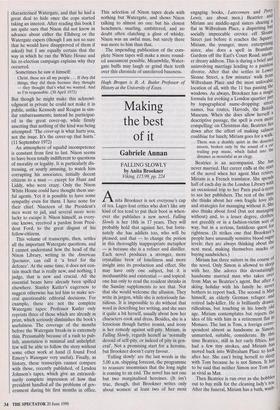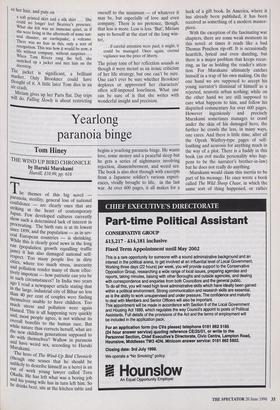Making the best of it
Gabriele Annan
FALLING SLOWLY by Anita Brookner Viking, £15.99, pp. 224 Anita Brookner is not everyone's cup of tea. Lager-lout critics who don't like any kind of tea tend to put their boot in when- ever she publishes a new novel. Falling Slowly is her 18th in 17 years. They will probably hold that against her, but fortu- nately she has addicts too, who will be pleased; and that — to change the potion in this thoroughly inappropriate metaphor — is because she is a refiner and distiller. Each novel produces a stronger, more crystalline brew of loneliness and more insight into its production and effect. She may have only one subject, but it is inexhaustible and existential — and topical: one has only to read the resident shrinks in the Sunday supplements to see that. Not that she would welcome the allusion. They write in jargon, while she is notoriously fas- tidious. It is impossible to do without that word in describing her writing, and she uses it quite a bit herself, usually about how her characters cook and dress. Besides, she is a ferocious though furtive ironist, and irony is her remedy against self-pity. Miriam, in Falling Slowly, regards herself as 'normally devoid of self-pity, or indeed of pity in gen- eral'. Not a promising start for a heroine, but Brookner doesn't curry favour.
`Falling slowly' are the last words in the 5.00 a.m. shipping forecast, the programme to reassure insomniacs that the long night is coming to an end. The novel has not one but two marginalised heroines. (It isn't true, though, that Brookner writes only about women: at least two of her most engaging books, Latecomers and Pell Lewis, are about men.) Beatrice and Miriam are middle-aged sisters sharing a flat in Wilbraham Place, a dispiriting but socially impeccable crevice off Sloane Street just before it reaches the Square. Miriam, the younger, more enterprising sister, also does a spell in Brarnhani Gardens off the Earl's Court Road, anoth- er dreary address. This is during a brief and uninvolving marriage leading to a painless divorce. After that she settles in Lower Sloane Street, a few minutes' walk from Wilbraham Place and the most unlovable location of all, with the 11 bus passing the windows. As always, Brookner has a magic formula for evoking a London quartier just by topographical name-dropping: street names, bus routes, Harrods, the British Museum. When she does allow herself a descriptive passage, the spell is even more compelling: on Christmas day, Beatrice lies down after the effort of making salmon coulibiac for lunch; Miriam goes for a walk: There was a deathly quiet in the deserted streets, broken only by the sound of a car trailing pop music, which faded into tke distance as mournful as an elegy.
Beatrice is an accompanist. She has never married. Her career entls at the start of the novel when her agent Max retires. Miriam is a French translator. She spends half of each day in the London Library with an occasional trip to her Paris pied-a-terre to see her publishers. The rest of the time she thinks about her own fragile love life and strategies for managing without it. She also thinks about food (but not managing without) and, to a lesser degree, clothes; not greedily or in a fashion-victim sort of way, but in a serious, fastidious quest for rightness. (It strikes one that Brookner people have unusually sensitive blood sugar levels: they are always thinking about the next meal, making themselves snacks or buying sandwiches.) Miriam has three suitors in the course of the novel. Only Simon is allowed to sleep with her. She adores this devastatinglY handsome married man who takes over from Max as Beatrice's agent. But after a skiing holiday with his family he never bothers to report back. The second is Max himself, an elderly German refugee and retired lady-killer. He is brilliantly drawn, ridiculous, but touching in his lonely old age. Miriam contemplates but rejects the idea of life with him in a retirement flat in Monaco. The last is Tom, a foreign corre- spondent almost as handsome as Simon; unmarried, suitable, considerate. By this time Beatrice, still in her early fifties, has had a few tiny strokes, and Miriam has moved back into Wilbraham Place to look after her. She can't bring herself to sleep with Tom because he is not Simon. It has to be said that neither Simon nor Tom are as vivid as Max.
Then Beatrice is run over as she hobbles out to buy milk for the cleaning lady's tea. After the funeral, Miriam has a bath, wash' es her hair, and puts on
a soft printed skirt and a silk shirt . . . She could no longer feel Beatrice's presence. What she felt was an immense quiet, as if she were living in the aftermath of some nat- ural disaster, an earthquake, a volcano. There was no fear in this, only a sort of recognition. This was how it would be now, a life without company, without surprises . . . When Tom Rivers rang the bell, she snatched up a jacket and met him on the doorstep.
The jacket is significant, a brilliant marker. Only Brookner could have thought of it. A little later Tom dies in an air crash.
Miriam gives up her Paris flat. Day trips will do. Falling Slowly is about restricting oneself to the minimum — of whatever it may be, but especially of love and even company. There is no pretence, though, that less is more. Less is less. 'But', Miriam says to herself at the start of the long win- ter, . if careful attention were paid, it might, it could be managed. Once again, eternal vigilance was the price of liberty.
The prissy tone of her reflection sounds as though it were meant as an ironic criticism of her life strategy, but one can't be sure. One can't ever be sure whether Brookner deplores or approvesof her characters' often self-imposed loneliness. What one can be sure of is that she writes with wonderful insight and precision.



























































 Previous page
Previous page